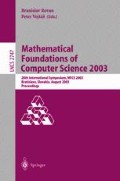Abstract
A Nash equilibrium of a routing network represents a stable state of the network where no user finds it beneficial to unilaterally deviate from its routing strategy. In this work, we investigate the structure of such equilibria within the context of a certain game that models selfish routing for a set of n users each shipping its traffic over a network consisting of m parallel links. In particular, we are interested in identifying the worst-case Nash equilibrium – the one that maximizes social cost. Worst-case Nash equilibria were first introduced and studied in the pioneering work of Koutsoupias and Papadimitriou [9].
More specifically, we continue the study of the Conjecture of the Fully Mixed Nash Equilibrium, henceforth abbreviated as FMNE Conjecture, which asserts that the fully mixed Nash equilibrium, when existing, is the worst-case Nash equilibrium. (In the fully mixed Nash equilibrium, the mixed strategy of each user assigns (strictly) positive probability to every link.) We report substantial progress towards identifying the validity, methodologies to establish, and limitations of, the FMNE Conjecture.
This work has been partially supported by the IST Program of the European Union under contract numbers IST-1999-14186 (ALCOM-FT) and IST-2001-33116 (FLAGS), by funds from the Joint Program of Scientific and Technological Collaboration between Greece and Cyprus, by research funds at University of Cyprus, and by the VEGA grant No. 2/3164/23.
Access this chapter
Tax calculation will be finalised at checkout
Purchases are for personal use only
Preview
Unable to display preview. Download preview PDF.
References
Czumaj, A., Vöcking, B.: Tight Bounds forWorst-Case Equilibria. In: Proceedings of the 13th Annual ACM Symposium on Discrete Algorithms, pp. 413–420 (2002)
Feldmann, R., Gairing, M., Lücking, T., Monien, B., Rode, M.: Nashification and the Coordination Ratio for a Selfish Routing Game. In: 30th International Colloquium on Automata, Languages and Programming (2003)
Fotakis, D., Kontogiannis, S., Koutsoupias, E., Mavronicolas, M., Spirakis, P.: The Structure and Complexity of Nash Equilibria for a Selfish Routing Game. In: Widmayer, P., Triguero, F., Morales, R., Hennessy, M., Eidenbenz, S., Conejo, R. (eds.) ICALP 2002. LNCS, vol. 2380, pp. 123–134. Springer, Heidelberg (2002)
Gairing, M., Lücking, T., Mavronicolas, M., Monien, B., Spirakis, P.: Extreme Nash Equilibria, March 2003, submitted for publication. Also available as Technical Report FLAGS-TR-02-5, Computer Technology Institute, Patras, Greece (November 2002)
Gonzalez, T., Ibarra, O.H., Sahni, S.: Bounds for LPT schedules on uniform processors. SIAM Journal on Computing 6(1), 155–166 (1977)
Graham, R.L.: Bounds on Multiprocessing Timing Anomalies. SIAM Journal on Applied Mathematics 17, 416–426 (1969)
Horowitz, E., Sahni, S.: Exact and aproximate algorithms for scheduling nonidentical processors. Journal of the Association of Computing Machinery 23(2), 317–327 (1976)
Koutsoupias, E., Mavronicolas, M., Spirakis, P.: Approximate Equilibria and Ball Fusion. In: Proceedings of the 9th International Colloquium on Structural Information and Communication Complexity (2002); accepted to Theory of Computing Systems
Koutsoupias, E., Papadimitriou, C.H.: Worst-case Equilibria. In: Meinel, C., Tison, S. (eds.) STACS 1999. LNCS, vol. 1563, pp. 404–413. Springer, Heidelberg (1999)
Mavronicolas, M., Spirakis, P.: The Price of Selfish Routing. In: Proceedings of the 33rd Annual ACM Symposium on Theory of Computing, pp. 510–519 (2001)
Moulin, H., Vial, L.: Strategically Zero-Sum Games: The Class of Games whose Completely Mixed Equilibria Cannot be Improved Upon. International Journal of Game Theory 7(3/4), 201–221 (1978)
Nash, J.F.: Equilibrium Points in N-Person Games. Proceedings of the National Academy of Sciences 36, 48–49 (1950)
Nash, J.F.: Non-cooperative Games. Annals of Mathematics 54(2), 286–295 (1951)
Osborne, M.J., Rubinstein, A.: A Course in Game Theory. MIT Press, Cambridge (1994)
Papadimitriou, C.H.: Algorithms, Games and the Internet. In: Proceedings of the 33rd Annual ACM Symposium on Theory of Computing, pp. 749–753 (2001)
Raghavan, T.E.S.: Completely Mixed Strategies in Bimatrix Games. Journal of London Mathematical Society 2(2), 709–712 (1970)
Author information
Authors and Affiliations
Editor information
Editors and Affiliations
Rights and permissions
Copyright information
© 2003 Springer-Verlag Berlin Heidelberg
About this paper
Cite this paper
Lücking, T., Mavronicolas, M., Monien, B., Rode, M., Spirakis, P., Vrto, I. (2003). Which Is the Worst-Case Nash Equilibrium?. In: Rovan, B., Vojtáš, P. (eds) Mathematical Foundations of Computer Science 2003. MFCS 2003. Lecture Notes in Computer Science, vol 2747. Springer, Berlin, Heidelberg. https://doi.org/10.1007/978-3-540-45138-9_49
Download citation
DOI: https://doi.org/10.1007/978-3-540-45138-9_49
Publisher Name: Springer, Berlin, Heidelberg
Print ISBN: 978-3-540-40671-6
Online ISBN: 978-3-540-45138-9
eBook Packages: Springer Book Archive

